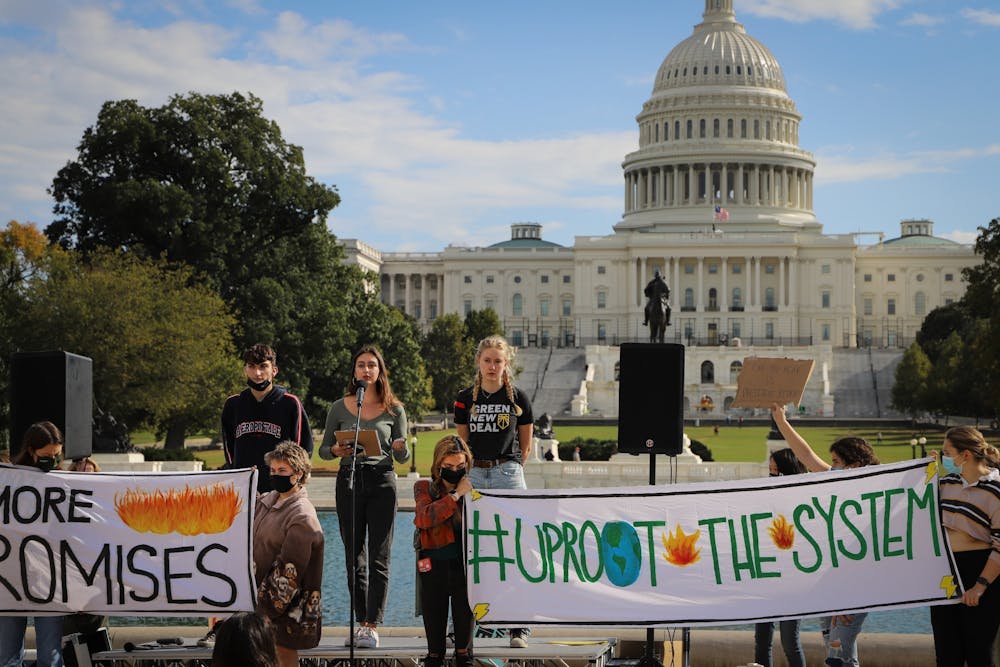From the Newsstands: This story appeared in The Eagle's April 2022 print edition. You can find the digital version here.
After decades of inaction by governments across the globe and countless warnings by climate scientists, people of all ages are feeling discouraged, overwhelmed and hopeless about the future.
This particularly impacts young people: a 2021 study from The Lancet found that young people are experiencing high levels of anxiety about climate change and government response to the climate crisis.
Magnolia Mead, an American University sophomore in the School of Public Affairs, is an organizer and communications lead at Sunrise Movement AU. Mead recalled how she felt after hearing about the outcomes of the COP26 summit last fall, which brought some countries to agreement but ultimately fell short of many climate activists’ hopes.
“I remember literally crying for hours because I just could not believe it,” Mead said. “Even after seeing this inaction over and over again, every time something like that happens, I just feel the immense fear. It’s just terrifying.”
Mead, like many others, became a climate organizer because people in her life are facing the immediate effects of climate change. Her family, who lives in Latin America, are no longer able to grow coffee due to the changing climate.
Oftentimes, Mead said that people ask her why she stays hopeful and continues to organize despite it taking up so much of her free time and the lack of government response. Her answer is simple.
“Usually people want some flowery answer … but the answer is literally just, ‘I have to.’ There’s no other option, it's literally about survival,” Mead said. “There are a lot of joyful moments in organizing. It’s a great community and everything, but it is a lot of work and the reason I do it is because it’s the only option.”
Sal Cottone, a freshman in the School of International Service, is one of the operations leads for Sunrise Movement AU. He said he has experienced climate anxiety personally.
“I didn’t want to have to go to class and know that there’s a future that’s going to be burnt down in front of our eyes,” Cottone said. “We’re seeing a government that isn’t doing anything about it.”
The lack of government action has been one of the main sources behind Cottone’s climate anxiety. Still, when asked about what he does to combat his climate anxiety, Cottone said he “just keeps fighting.”
Tacy Lambiase, the sustainability manager at the AU Office of Sustainability, is a volunteer for Climate Awakening, an online space for people to discuss emotions about climate change. Lambiase has seen people of all age groups from across the word express that climate change has massively impacted their mental health.
“I’ve heard a lot of people say that they don’t have anyone to talk about climate anxiety with, or climate change in general,” Lambiase said. “And so I think it’s important that there are more spaces being created for people to have those conversations and explore how they’re feeling related to climate change.”
Finding a community and acting in a community can help you feel less alone and like you’re having a greater impact beyond yourself, according to Lambiase. She also tries to follow Jane Goodall’s message of thinking globally but acting locally.
“I, as an individual, can’t necessarily influence things on a global level and if I tried to do that, I would absolutely burn out,” Lambiase said.
Instead, she said she works on the change that she can make within her job, family or friends.
Mead echoed the idea that talking about climate change with others is the best way to cope with climate anxiety and inspire change.
“It feels taboo. No one wants to bring it up because no one wants to admit that we’re headed for catastrophe,” Mead said, noting the hesitancy from her peers at AU to bring up climate change in environments like the classroom. “But if you start talking about it with other people, you realize that a lot of us are in the same boat. And if you continue to talk about it, you’ll inspire other people to take action with you, and that’s really what gives me hope.”
Shea Neary, a sophomore in the School of International Service, said it was a Habits of Mind course that brought climate change to light.
In a class with AU Environmental Science professor Karen Knee, the glacier unit was the most “worrying,” Neary said.
Neary realized that “our future is in the hands of corporations,” but still has hope that there are “small-scale” individual acts that can benefit the planet.
Knee emphasizes the importance of sharing positive stories related to climate change in her classes. She teaches the 100-level class “Nature of Earth,” so many of her students are studying climate change in detail for the first time.
“I try to provide positive stories of people that have made a difference and things that have actually worked to dispel the idea that being really fatalistic or depressed is an appropriate response to this,” Knee said.
Knee also suggested that people take responsibility for helping the environment without feeling guilty for things out of our control.
“I don’t think anyone needs to bear the weight of poor decisions that were made by tons of other people, but we do have the responsibility to fix the problem that’s before us right now,” Knee said. “Let go of guilt that’s not helping you, focus on things that you can actually do, whether it's lobbying for a cause that’s important to you, switching to a plant based diet, reducing your reliance on fossil fuels … all these things are pretty productive, so channel your efforts that way.”





